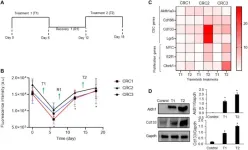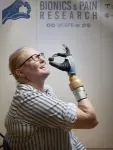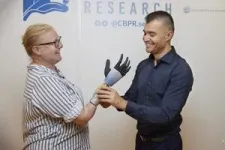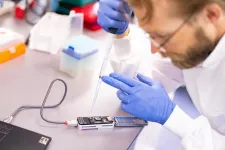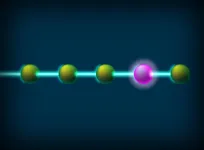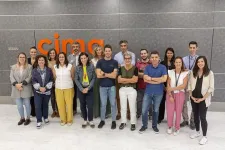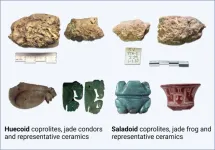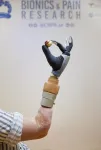Suppression of cancer stemness and drug resistance via BRAF/EGFR/MEK inhibition in colorectal cancer cells
2023-10-11
(Press-News.org)
“[...] our approach enables mechanistic studies of drug resistance with 3D cultures of primary cancer cells to develop and test treatments that suppress cancer [...].”
BUFFALO, NY- October 11, 2023 – A new research paper was published in Oncotarget's Volume 14 on October 4, 2023, entitled, “Inhibiting BRAF/EGFR/MEK suppresses cancer stemness and drug resistance of primary colorectal cancer cells.”
Drug resistance is a major barrier against successful treatments of cancer patients. Gain of stemness under drug pressure is a major mechanism that renders treatments ineffective. Identifying approaches to target cancer stem cells (CSCs) is expected to improve treatment outcomes for patients. In their new study, researchers Astha Lamichhane, Gary D. Luker, Seema Agarwal, and Hossein Tavana from The University of Akron, University of Michigan and Georgetown University aimed to elucidate the role of cancer stemness in resistance of colorectal cancer cells to targeted therapies.
“[...] we developed spheroid cultures of patient-derived BRAFmut and KRASmut tumor cells and studied resistance mechanisms to inhibition of MAPK pathway through phenotypic and gene and protein expression analysis.”
They found that treatments enriched the expression of CSC markers CD166, ALDH1A3, CD133, and LGR5 and activated PI3K/Akt pathway in cancer cells. The team examined various combination treatments to block these activities and found that a triple combination against BRAF, EGFR, and MEK significantly reduced stemness and activities of oncogenic signaling pathways. This study demonstrates the feasibility of blocking stemness-mediated drug resistance and tumorigenic activities in colorectal cancer.
“Our approach to identify mechanisms of drug resistance of patient-derived cancer cells to targeted therapies and develop effective treatments is promising toward cancer precision medicine.”
Read the full paper: DOI: https://doi.org/10.18632/oncotarget.28517
Correspondence to: Hossein Tavana
Email: tavana@uakron.edu
Keywords: drug resistance, cancer stem cells, patient-derived tumor model, colorectal cancer, combination treatment
About Oncotarget: Oncotarget (a primarily oncology-focused, peer-reviewed, open access journal) aims to maximize research impact through insightful peer-review; eliminate borders between specialties by linking different fields of oncology, cancer research and biomedical sciences; and foster application of basic and clinical science.
To learn more about Oncotarget, visit Oncotarget.com and connect with us on social media:
X, formerly known as Twitter
Facebook
YouTube
Instagram
LinkedIn
Pinterest
LabTube
Soundcloud
Sign up for free Altmetric alerts about this article: https://oncotarget.altmetric.com/details/email_updates?id=10.18632%2Foncotarget.28517
Click here to subscribe to Oncotarget publication updates.
For media inquiries, please contact: media@impactjournals.com.
Oncotarget Journal Office
6666 East Quaker Str., Suite 1A
Orchard Park, NY 14127
Phone: 1-800-922-0957 (option 2)
###
END
ELSE PRESS RELEASES FROM THIS DATE:
2023-10-11
Orchids, mosses, ferns—or epiphytes, defined as nonparasitic plants that grow on other plants—are crucial for Earth’s biodiversity and play essential roles in forests around the world, building habitat in trees for myriad other life forms, from bacteria and insects to birds and reptiles.
However, the very attributes that have enabled epiphytes to thrive in forest canopies are now making them vulnerable to both natural and human-caused disturbances, according to Nalini Nadkarni, the University of Utah biologist renowned for her pioneering work studying and conserving treetop ecosystems.
In a study published this month, Nadkarni found these vital plants ...
2023-10-11
What type of brain tumor does this patient have? AI technology helps to determine this as early as during surgery, within 1.5 hours. This process normally takes a week. The new technology allows neurosurgeons to adjust their surgical strategies on the spot. Today, researchers from UMC Utrecht and researchers, pathologists and neurosurgeons from the Princess Máxima Center for pediatric oncology and Amsterdam UMC have published about this study in Nature.
Every year, 1,400 adults and 150 children are diagnosed with a tumor in the brain or spinal cord in the Netherlands. Surgery is often the ...
2023-10-11
Quantum computers of the future hold promise in solving all sorts of problems. For example, they could lead to more sustainable materials, new medicines, and even crack the hardest problems in fundamental physics. But compared to classical computers in use today, rudimentary quantum computers are more prone to errors. Wouldn't it be nice if researchers could just take out a special quantum eraser and get rid of the mistakes?
Reporting in the journal Nature, a group of researchers led by Caltech is among the first to demonstrate a type of quantum eraser. The physicists show that they can pinpoint and correct for mistakes in quantum computing ...
2023-10-11
Researchers from Cima and the Clínica Universidad de Navarra, together with the international cooperative group Diffuse Midline Glioma (DMG-ACT), have confirmed that blocking an immune checkpoint molecule reduces the tumor and prolongs survival in animal models of the most aggressive childhood cancer. This research, carried out at the Cancer Center Clínica Universidad de Navarra, shows that inhibition of TIM-3 promotes the immune memory of diffuse intrinsic stem glioma (DIPG) and improves the prognosis of the disease.
DIPG is an aggressive brain stem tumor and the leading cause of death related to pediatric cancer. Due to its location therapeutic ...
2023-10-11
DNA analysis of mummified poop reveals two pre-Columbian Caribbean cultures ate a wide variety of plants, like maize, sweet potato, and peanuts—and tobacco and cotton traces were detected too, according to a study published October 11, 2023 in the open-access journal PLOS ONE by Jelissa Reynoso-García from the University of Puerto Rico, Puerto Rico, and colleagues.
Mummified poop, or coprolites, can reveal clues to diet and lifestyle. In this study, Reynoso-García and colleagues analyzed plant DNA isolated from coprolites sampled from archeological sites of two pre-Columbian cultures (Huecoid and Saladoid) to see what these peoples ate ...
2023-10-11
Modifiable risk factors—including hypertension, obesity, diabetes, low HDL cholesterol and sleep disorders—confer a higher risk of dementia for people in some minority ethnic groups compared to White people, according to a new study published this week in the open-access journal PLOS ONE by Naaheed Mukadam of University College London, UK, and colleagues.
The number of people with dementia is on the rise around the world. There has been increasing interest in potentially modifiable risk factors, ...
2023-10-11
In a new study, participants tended to rate women’s bodies as slimmer when viewed in selfie photographs than in photographs taken from other angles. Ruth Knight of York St John University, UK, and Catherine Preston of the University of York, UK, present these findings in the open-access journal PLOS ONE on October 11.
Popular on social media, selfies are portraits taken by the photo’s subject, who positions the camera away from their body but pointed back at themself. Prior research has suggested that viewing selfies might affect viewers’ judgments of the photo subjects’ attractiveness and could, in some cases, lead to ...
2023-10-11
Karin's life took a dramatic turn when a farming accident claimed her right arm over 20 years ago. Since then, she endured excruciating phantom limb pain. “It felt like I constantly had my hand in a meat grinder, which created a high level of stress and I had to take high doses of various painkillers.” In addition to her intractable pain, she found that conventional prostheses were uncomfortable and unreliable, and thus of little help in daily life. All this changed when she received groundbreaking bionic technology that allowed her to wear a much more functional ...
2023-10-11
UCLA researchers have developed a new treatment method using a tiny nanocapsule to help boost the immune response, making it easier for the immune system to fight and kill solid tumors.
The investigators found the approach, described in the journal Science Translational Medicine, increased the number and activity of immune cells that attack the cancer, making cancer immunotherapies work better.
“Cancer immunotherapy has reshaped the landscape of cancer treatment,” said senior author of the ...
2023-10-11
Giving living donor liver transplant recipients an infusion of immune cells derived from their donor a week before transplantation is feasible, safe – and may lead to recipients being successfully weaned off immunosuppressant medications without rejecting the transplanted organ.
The early-stage clinical trial results by University of Pittsburgh School of Medicine scientists, reported today in Science Translational Medicine, point to a path that may spare organ transplant recipients from the serious side effects of long-term immunosuppressant use, which can include cancer, diabetes, kidney failure and susceptibility to infections.
“These trial results are very encouraging,” ...
LAST 30 PRESS RELEASES:
[Press-News.org] Suppression of cancer stemness and drug resistance via BRAF/EGFR/MEK inhibition in colorectal cancer cells
